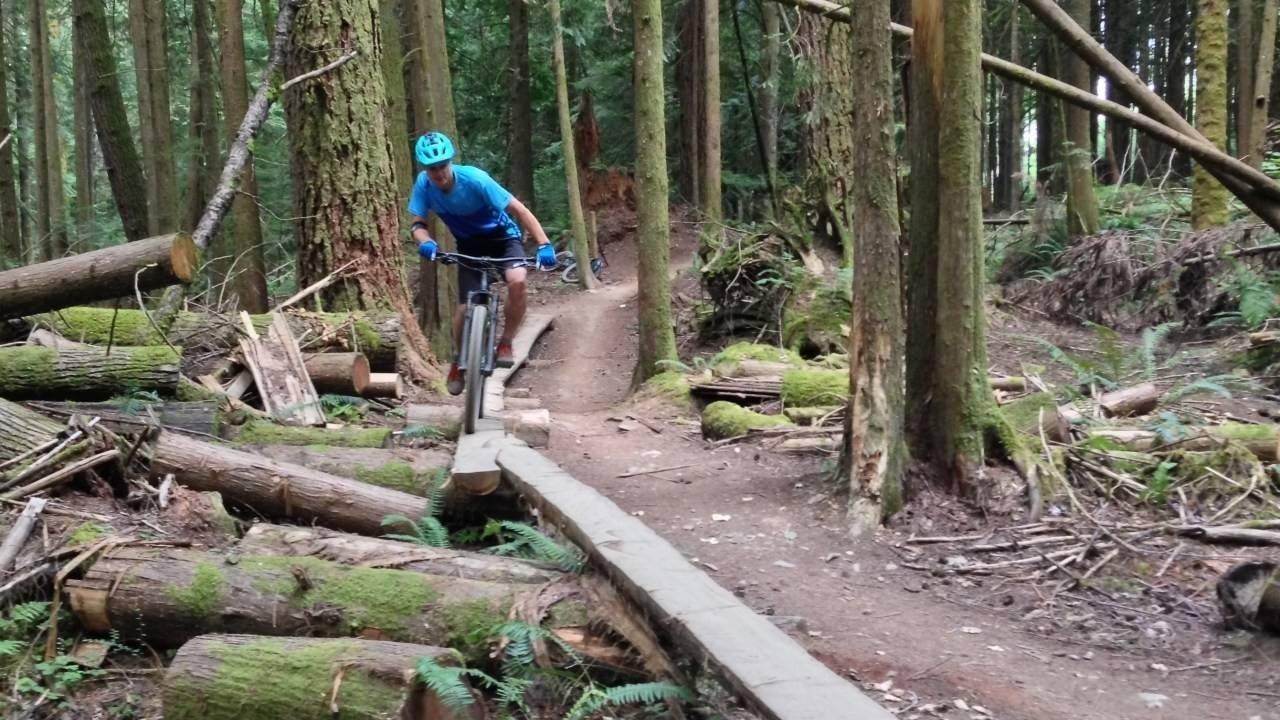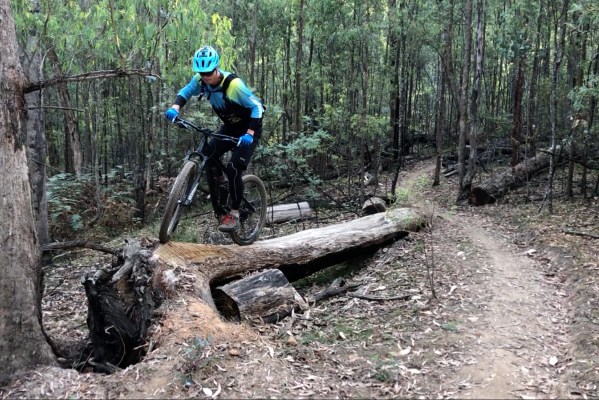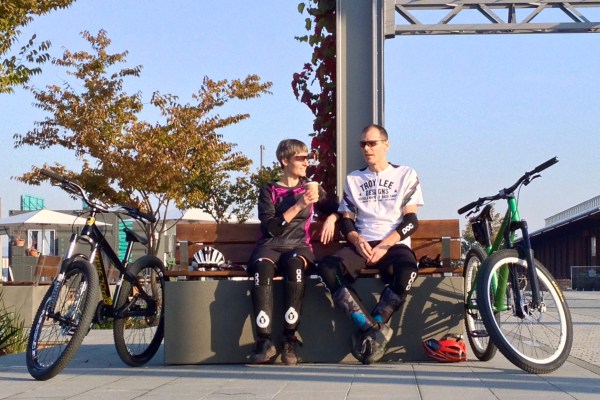Top 9 Tips for Improving MTB Skills

Adding new MTB skills to your quiver looks so easy in the videos. Yet some riders struggle to make real progress. RLC Ambassador, Carl Roe shares the secrets.
When I signed up for my first MTB skills clinic in 2014, I’d been mountain biking for 7 years and thought I had the sport pretty much figured out. But I quickly discovered that a high level of fitness, a good bike, clipless pedals, and familiarity with my local trails was masking a dark secret: My technique was terrible.
I’d fallen into the trap of thinking that the more I rode, and the fitter I got, the better I was. I didn’t know what I didn’t know.
Here are my Top 9 tips to developing better skills:
 Pre-skills training: all speed, no technique
Pre-skills training: all speed, no technique
1 - Come Back to Earth
Step one: Acknowledge your actual ability level.
Have you noticed how new riders are beginners for only a ride or two, before promoting themselves to “intermediate”?
This is where the illusion begins. But there’s a world of difference between surviving an intermediate trail and shredding it.
If you’ve been existing on a diet of advice from fellow riders and free online videos, chances are you’re going to have to re-learn a ton of stuff.
Accurate self assessment is the first step to meaningful progress. Get ready to have your ego challenged.
2 - Take Your Time
Improving skills takes years of dedicated practice.
It’s just not possible to master a new skill in an afternoon, a day, or a weekend. Hell, it took me 3 months of dedicated practice before I pulled my first real bunnyhop. And I’ve been working on my jumping for over 2 years.
Don’t set yourself up for failure by imposing a deadline and measuring success based purely on progression.
Regular progression over the long term is the secret sauce.
3 - Enjoy the Rollercoaster
Progressing skills is like riding a rollercoaster.
Some days you experience satisfying progression and feel the stoke. Other days it can feel like nothing is working.
This is because progression isn’t linear, it’s like riding a rollercoaster and it can be a wild emotional ride.
You’ll have good days and bad days, but it’s this dynamic that makes the inevitable breakthroughs so incredibly satisfying. You just have to hang in there, success will come when your body and mind are ready for it.

One day it's easy, the next it isn't - what's the deal with that?
4 - Beware of Generic Skills Tips
Mountain biking is full of techniques that are both counterintuitive and situation specific.
The sort of tips you receive from well-meaning riders at the trailhead might sound like sage advice, but these “Tip Traps” are often incomplete and potentially dangerous.
Get a real coach! And ignore the free YouTube tutorials that promise you’ll learn to jump in 10 minutes.
I’ve tried everything and found that pay-to-play online coaching (I’ve been an RLC member for 5 years) is the most cost effective, potent and sustainable method over the long term, unless you can afford to keep a personal coach on cash retainer. The occasional private session with a personal coach is also a valuable experience.
BECOME AN RLC MEMBER AND GET PERSONALIZED COACHING FEEDBACK
5 - Go Easy, Tiger
A lot of riders come to skills development during middle age, or even older. If you're like me and prone to getting carried away when practicing, listening to your body will save on physio bills.
I’ve struggled with niggly injuries that have stalled my progression for extended periods, and it’s as frustrating as hell.
We need to treat our bodies with care.
I find practicing multiple skills in the same session provides variety to keep things interesting, but also helps spread out the stress on the body.
Doing 80 manual front wheel lifts back-to-back is the fastest way to an overuse injury.
6 - Reject Crash Culture
Fail videos are entertaining to watch, but they can also teach us a lot about MTB culture.
Fails come in two flavours: riders who know what they are doing and crash because shit happens; and riders who are just “sending it”, hoping full commitment will make up for a lack of ability.
If you want to be riding in 10 years - know your limits and reject crash culture... bro.
There’s a big difference between thinking you can do something and having the experience to know you can do it.

Shit happens sometimes, but it doesn't always have to...
7 - Seek Feedback
There are two key ingredients required to see meaningful progression.
The first is practicing the right progressions in the right order. Choosing the right coach and/or coaching service is critical; free content is usually missing key progressions.
The second is regular feedback on your technique, ideally via slow motion video.
Analyzing the video yourself will deepen learning, or seek feedback from your coach (if available); ideally do both.
Learning is part practice, part feedback, don’t be tempted to skip a vital part of the process, that’s where the biggest gains are hiding.
At RLC we provide detailed video progressions and unlimited coaching feedback. Start your free trial today.
8 - Take It Back a Notch
You’ve got two choices when riding. You can concentrate on speed, going faster and faster each ride, or you can take it back a notch and focus on your skills. You can’t do both! Slowing down provides time to experiment with, and integrate, new movement patterns.
Sessioning a section of trail allows different approaches to be tested.
Pushing yourself to ride faster and faster is a dead end strategy, because eventually technique flaws prevent additional speed.
So take it back a notch, ride at 80-90%, spend some time sessioning, or repeat a tech climb if you put a foot down. Make style the measure of a successful ride, not imaginary online medals.
You’ve got to go slow in order to learn how to ride fast.

Sessioning an obstacle helps bring skills to the trail
9 - Show Up
No one has ever become strong by watching online weight lifting tutorials or sitting in the gym staring at the weight rack.
You’ve got to show up and put in the work.
The good news is practicing skills is a blast. But fun doesn’t mean easy. And that’s the point, if it were easy everyone would be able to manual, wheelie, hop, trackstand, rock, nose pivot, bunnyhop, fakie, jump, roost berms, send drops... you get the idea.
Conclusion
Hopefully these tips have challenged your preconceptions about what it takes to develop skills.
There’s a lot of misleading information on the interwebs. And those damn pros always make things look so easy!
But if you set your direction and hold true, you’ll discover a whole new world of mountain biking. You’ll learn to throw down moves that will have people saying: “That’s amazing, how did you do that?”. And when they do, don’t be modest. Tell them it was a ton of practice, but that it was also a lot of fun, like being a kid again.
Bonus Tip
For those who have read all the way to the end, here's a bonus tip: Find a practice buddy. It really helps to have someone to help motivate you to get out on the bike, someone who can provide instant feedback, make suggestions, shoot video and share a post-practice coffee.
Sharing the stoke works!

Share the experience with a buddy when you can
About Carl
Carl Roe has been a Ryan Leech Connection member and ambassador for 5 years and occupies the role of Ambassador Liaison, ensuring every member receives an appropriate and timely response to their skill-related comments and videos
Want to take your MTB skills to the next level?
The RLC Membership is an online mountain bike coaching platform. As a member, you get access to over 600 video tutorials and unlimited coach feedback. It's one of the most effective ways to make progress in your riding skills.
Over the last 4 years, RLC has helped thousands of riders make significant progress in their riding abilities.
Stay connected with news and updates!
Join our mailing list to receive the latest news and updates from our team.
Don't worry, your information will not be shared.
We hate SPAM. We will never sell your information, for any reason.






